By John Haughey
The Center Square
September 11, 2020
 President Donald Trump’s executive order extending the moratorium on oil drilling in the eastern Gulf of Mexico through 2032 can be repealed at any time by executive whim and is not a solution preferred by Florida’s congressional delegation and two U.S. senators.
President Donald Trump’s executive order extending the moratorium on oil drilling in the eastern Gulf of Mexico through 2032 can be repealed at any time by executive whim and is not a solution preferred by Florida’s congressional delegation and two U.S. senators.
U.S. Rep Francis Rooney, R-Naples, and 12 bipartisan Florida co-sponsors spearheaded the adoption last September of House Bill 205, the Protecting and Securing Florida’s Coastline Act of 2019, in a 248-180 vote. Only one of Florida’s 27 House members, Rep. Ted Yoho, R-Gainesville, voted against the bill.
U.S. Sens. Marco Rubio and Rick Scott introduced Senate Bill 13, the Florida Shores Protection and Fairness Act, in January 2019. It remains unheard, but its proposal to extend the drilling ban to 2034 is closer to Trump’s order, which he unveiled Tuesday during a campaign rally in Jupiter.
The eastern Gulf has been off limits to oil leasing since 1985. After the 2010 BP/Deepwater Horizon disaster, President Barack Obama’s administration imposed a 10-year ban on drilling in the eastern Gulf.
Drilling is unpopular in Florida. Nearly 69 percent of voters in 2018 supported a state constitutional amendment to ban off-shore drilling.
Rooney, who is not seeking re-election, and Rubio were among those, including Democrats, who praised Trump’s extension but said it’s a temporary solution.
“I have worked tirelessly during my four years in Congress to unite Florida’s congressional delegation on this issue, pass legislation (H.R. 205) to permanently extend the moratorium on drilling in the EGOM (Eastern Gulf of Mexico), and lobby this administration on the need to keep offshore drilling from being a potential danger to our economy, ecology, and military readiness,” Rooney said in a statement.
“I hope the Senate will now realize what the House of Representatives and President Trump realize – that Florida needs to be protected from offshore drilling – and act to convert this executive order into formal legislation like H.R. 205 so it cannot be easily reversed by a future administration,” Rooney said.
“I will continue working with the administration and my colleagues in Congress to secure a permanent legislative solution that cannot be undone by a future administration,” Rubio said.
Many Democrats dismissed Trump’s extension as a ploy to secure the state’s 29 electoral votes in November.
“Every election season, the Trump administration declares drilling for oil off the coast of Florida ‘off the table,’ but then sides with oil companies when voters aren’t watching,” U.S. Rep Kathy Castor, D-Tampa, said. “If President Trump truly meant what he said, he would call for Senate passage of the bipartisan (H.R. 205) that passed the House in September of 2019 to make permanent the ban on drilling in the Gulf of Mexico.”
U.S. Rep Debbie Mucarsel-Powell, D-Miami, said Trump will repeal the executive order if re-elected.
“He has clearly signaled he will reverse this announcement shortly after the election and allow for drilling,” Mucarsel-Powell said. “The blatant greenwashing of his campaign is nothing but a scheme.”
Those “signals” were incorporated into the Department of Interior’s 2017 draft plan to overturn the ban before it expired in 2022 and allow drilling off Florida.
Then-Interior Secretary Ryan Zinke, in response to vocal Florida Republican critics, including then-Gov. Scott, withdrew the plan in 2018.
Department of Interior (DOI) Secretary David Bernhardt said the plan’s release was “indefinitely” delayed. Politico later reported the plan would be published in mid-November.
According to the DOI and industry sources, there is an estimated 3.6 billion “recoverable barrels” of oil and 11.5 trillion cubic feet of gas off Florida’s west coast. Developing them could create 56,000 new jobs by 2035 and annually generate more than $2.6 billion in taxable revenue.
